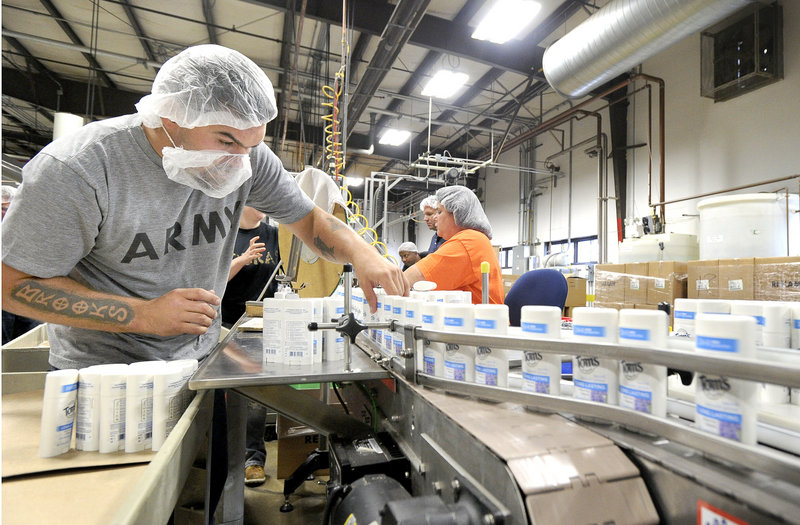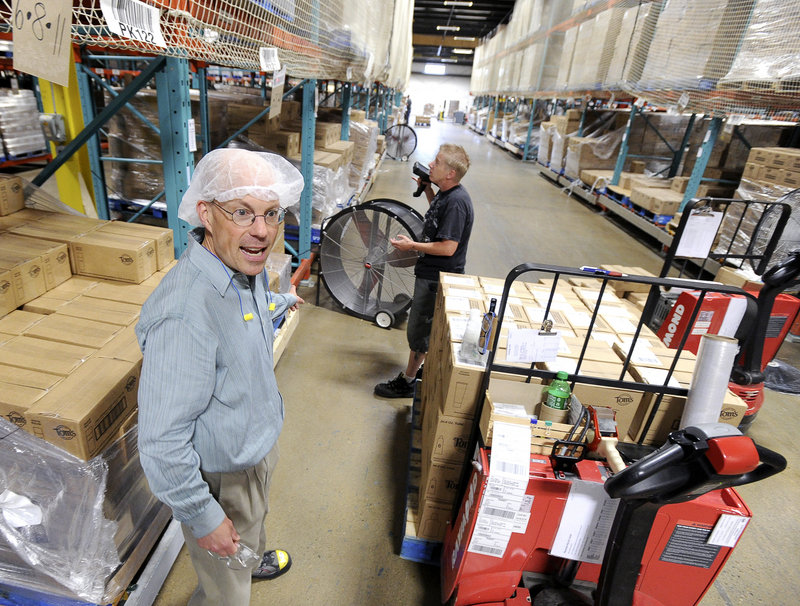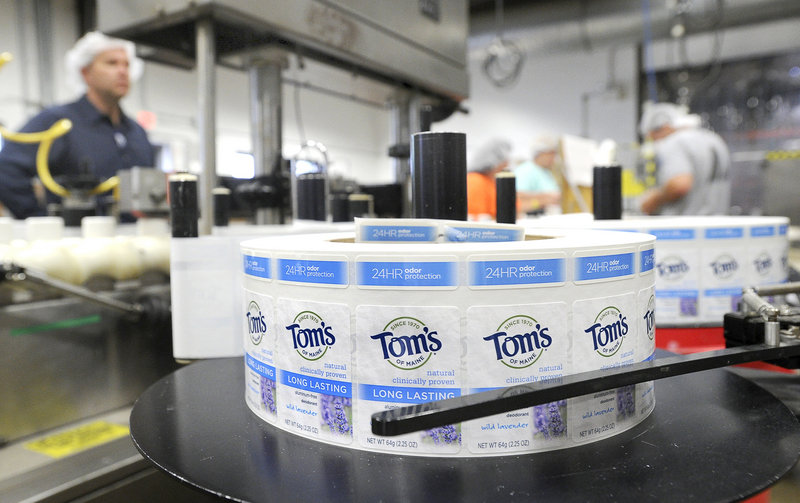SANFORD – The cool scent of mint permeated Tom’s of Maine’s Sanford factory last week.
The odor, which hits you when you walk in the front door, hints at the products rolling down the factory line.
Today, Tom’s of Maine is mixing batches of peppermint propolis toothpaste, explained Plant Manager Bill Hetzel. “On days when we make fennel toothpaste, there’s a scent of fennel in the air.”
With an eye toward sustainability and a host of products made from natural ingredients like fennel and mint oil, Tom’s of Maine has become a leading maker of natural personal care products.
“Consumers are becoming more and more committed to safe, effective, natural products that work,” said Tom’s of Maine CEO Tom O’Brien. “People want to avoid dyes and artificial flavorings. We never use stuff like that because we believe you can do the same thing using ingredients found in nature.”
That philosophy has paid off for the company, which makes personal care products like deodorant, toothpaste, mouthwash, soap and dental floss.
Tom’s of Maine, now owned by New York City-based Colgate-Palmolive Co., sells products in Canada, the United Kingdom and throughout the United States. The 40-year-old company has 160 staffers, revenue of more than $50 million and is on track to double in size in five years, said O’Brien.
Tom’s of Maine’s roots stretch to 1968, when former healthcare executive Tom Chappell and his wife Kate moved from Philadelphia to Maine. They launched Tom’s in 1970 with a $5,000 loan and initially sold natural laundry detergent. In the mid-1970s, the Chappells introduced natural toothpastes and deodorant, now leading products.
O’Brien said the company had revenue of between $4 million and $7 million when he was hired as chief operating officer in 1997.
Revenue hit about $50 million by 2006, when Colgate-Palmolive purchased 84 percent of the company for roughly $100 million. Tom and Kate Chappell retained minority ownership, though they retired from the business.
O’Brien declined to discuss Tom’s of Maine’s current revenue, but said there has been “very healthy growth” since 2006.
He added, “In five years, at the current pace, we will be twice as large as we are today.”
At the Sanford plant, Tom’s of Maine has two production lines that churn out between 120,000 and 140,000 units daily.
Plant Manager Hetzel said some of the company’s ingredients are like fine wines — expensive and sourced from speciality suppliers. Hops used in deodorant, for instance, come from Germany and mint oils come from regions of the northwestern United States.
Executives at Tom’s of Maine speak frequently of sustainability.
The company recycles some 200,000 pounds of materials every year, including cardboard boxes, paper, steel drums and sorted plastic.
Some packaging — deodorant containers, for instance — are both recyclable and made from recycled plastic.
Tom’s of Maine also buys wind energy credits to offset energy use and donates 10 percent of pre-tax profits to charitable organizations,
Employees are encouraged to use 5 percent of work time volunteering, and the company pays staffers $4,000 towards the purchase of hybrid cars.
Tom’s of Maine also has helped fund research to create bioplastic containers made from Maine potatoes.
Spokesperson Susan Dewhirst said a prototype container could be created within a year.
But O’Brien said sustainability isn’t enough. The products must also be effective.
“We have to find ways of using natural ingredients to have the same aesthetics as well as the same end benefits,” said O’Brien. “We can’t have natural products that don’t work.”
Patrick Rea, publisher and editorial director of Nutrition Business Journal, which tracks industry sales, said the nutritional personal care market had consumer sales of roughly $10 billion in 2010, up 6 percent from 2009. Sales grew 2 percent in 2009 and 13 percent in 2008.
John Gay, executive director and CEO of Washington, D.C.-based Natural Products Association, said consumers increasingly view natural products as a necessity, not a luxury.
That’s partly why the industry grew during recession.
“You cut out luxuries during tough economic times. If it’s a necessity, you keep it in the budget,” Gay said.
Rea said the industry has also grown because mass-market retailers, like club stores, pharmacy and supermarket chains and big-box stores like Target, now sell a host of natural personal care products.
Rea said expansion into mainstream markets can be risky for personal care companies.
Sometimes natural products firms change ingredients in response to pressure from large retailers.
If that happens, Rea said, a company might lose the trust of independent retailers and consumers.
Rea said acquisitions can also threaten the independent identity of natural product companies.
Therefore, he said it’s best when the parent company remains largely “behind the scenes.”
Rea called Colgate-Palmolive’s purchase of Tom’s of Maine “relatively successful” because Tom’s remained in Maine and operates like an autonomous company.
O’Brien said Colgate-Palmolive acts as Tom’s of Maine’s bank and helps fund new projects, such as a recent waste-water reduction program at the Sanford plant.
Other than that, however, Tom’s of Maine remains largely independent.
“We stand alone,” O’Brien said. “But it’s nice to have a big brother at times.”
Jonathan Hemmerdinger can be reached at 791-6316 or:
jhemmerdinger@mainetodaycom
Send questions/comments to the editors.





Success. Please wait for the page to reload. If the page does not reload within 5 seconds, please refresh the page.
Enter your email and password to access comments.
Hi, to comment on stories you must . This profile is in addition to your subscription and website login.
Already have a commenting profile? .
Invalid username/password.
Please check your email to confirm and complete your registration.
Only subscribers are eligible to post comments. Please subscribe or login first for digital access. Here’s why.
Use the form below to reset your password. When you've submitted your account email, we will send an email with a reset code.